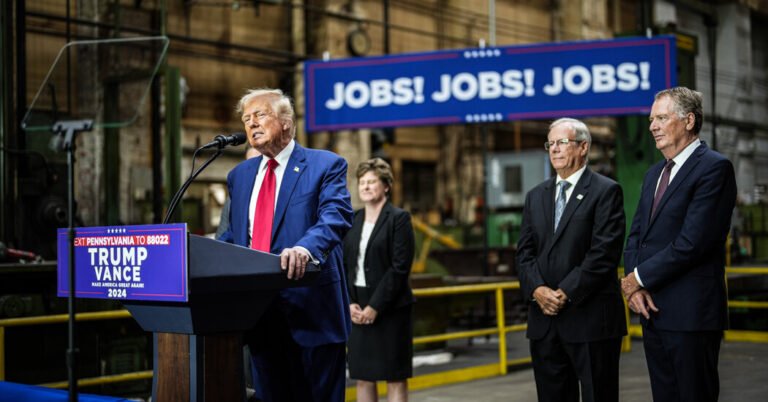
Hours before President Biden was expected to speak at the Democratic National Convention on Monday, former President Donald J. Trump accused Mr. Biden of being corrupt, fell back on his insistence that the court cases against him were election interference and claimed Democrats did an “overthrow or a coup” in replacing Mr. Biden atop the ticket with Vice President Kamala Harris.
During a speech, billed by his campaign as being focused on the economy, Mr. Trump went on what he acknowledged was a digression on a report from House Republicans that accused Mr. Biden of seeking to allow his family to profit off his office. The report contained no proof that Mr. Biden, when he was vice president, engaged in any corrupt activity to benefit his son Hunter’s business partners.
But Mr. Trump, who has continued to needle Mr. Biden as he adapts to a new opponent, insisted that the report vindicated him. He also claimed he was exonerated in a federal classified documents case against him, even though the judge’s ruling dismissing the case did not address his guilt or innocence.
Mr. Trump, who was dogged by questions over conflicts of interest during his presidency and was indicted four times last year, portrayed himself as ethical.
“I would have made billions of dollars in this job if I wanted to play that game the way they played it,” Mr. Trump said. “But instead I took the job very seriously and very importantly.”
Mr. Trump has spent considerable time attacking Mr. Biden in his campaign speeches, even as his campaign and Democrats have shifted their focus to Ms. Harris. Still, his remarks on Monday included some personal attacks on Ms. Harris.
Her father is an emeritus professor whose work often questioned mainstream economic theory, and Mr. Trump portrayed him as a “Marxist professor.” Mr. Trump questioned whether Democrats “knew where she comes from, where she came from, what her ideology is,” when they united behind Ms. Harris.
Yet, even as Mr. Trump veered into asides, Monday’s speech at a factory in York, Pa., hewed more closely to its stated focus on the economy than some of his recent efforts to focus on policy had.
With just around 150 people gathered, the event was smaller and less energetic than a typical Trump campaign rally. The crowd had muted responses as Mr. Trump, standing on a factory floor in front of heavy manufacturing equipment, called for more tariffs, attacked electric vehicles and rattled off a number of figures to bolster his argument that the economy had been in better shape during his presidency.
Mr. Trump exaggerated his own economic record during his speech, insisting he left office with a “surging economy.” At the time, the country was facing large unemployment and supply chain disruptions spurred on by the coronavirus pandemic in his final year in office.
Mr. Trump took direct aim at Ms. Harris’s economic agenda, arguing that her plans to limit corporate “price gouging” amounted to price controls. He also criticized her for failing to explain how she would pay for the spending increases and tax cuts her plan calls for. And he once again criticized her for calling for a ban on hydraulic fracturing, or fracking, in her failed 2020 presidential run.
Fracking is an important issue in Pennsylvania, a critical battleground state that is a major hotbed of natural gas. Mr. Trump has made increasing oil and gas production a central tenet of his proposal to fight inflation, even as domestic crude oil production is already at a record high. On Monday, he also vowed to ramp up America’s use of nuclear energy if re-elected.
“We will embrace all forms of energy, including nuclear,” Mr. Trump said, promising to foster more development of small nuclear reactors to bring energy costs down. “Nuclear is great energy.”
A Harris campaign spokeswoman, Sarafina Chitika, argued in a statement that Mr. Trump’s proposals would hurt American families and do little to address economic concerns.
Ms. Chitika said: “Americans should be clear on what he will do: He will raise costs on middle class families by $3,900 a year. He will ship American jobs overseas. He will cut Social Security and Medicare and repeal the Affordable Care Act — just like he tried to do last time he was in the White House.”
Mr. Trump’s speech on Monday kicked off a week of events in battleground states that his campaign said he would use to emphasize issues and policy areas it believed would be advantageous. His public schedule, which includes an event every day of the Democratic National Convention and two on Friday, is his busiest stretch of campaigning since the Republican primary.
Mr. Trump is scheduled to travel to Michigan on Tuesday to talk about crime and safety. On Wednesday, he and his running mate, Senator JD Vance of Ohio, will discuss national security at an aviation museum in North Carolina.
On Thursday, hours before Ms. Harris will speak at the convention, Mr. Trump will visit a section of the United States’ border with Mexico in Arizona, where he will talk about immigration and border security.
Whether Mr. Trump will adhere to the focus of each event is an open question. During his presidency and on the campaign trail, Mr. Trump has often quickly abandoned his prepared remarks and veered into more wide-ranging speeches that are closer in style to his political rallies.